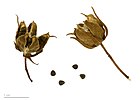Note: This is a project under development. The articles on this wiki are just being initiated and broadly incomplete. You can Help creating new pages.
Pentapetes phoenicea
Pentapetes phoenicea is a genus of flowering plants in the family Malvaceae. It contains a single species, Pentapetes phoenicea, called the noon flower and occasionally cultivated.
Contents
[hide]- 1 Uses
- 2 Parts Used
- 3 Chemical Composition
- 4 Common names
- 5 Properties
- 6 Habit
- 7 Identification
- 8 List of Ayurvedic medicine in which the herb is used
- 9 Where to get the saplings
- 10 Mode of Propagation
- 11 How to plant/cultivate
- 12 Commonly seen growing in areas
- 13 Photo Gallery
- 14 References
- 15 External Links
Uses
Fever, Astringent, Antibilious, Antiphlegmonous, Snake bites.
Parts Used
Chemical Composition
It contains alkaloids, flavonoids, saponins, steroids, phenolics, coumarins and triterpenoids in leaf, stem and root extracts.[1]
Common names
| Language | Common name |
|---|---|
| Kannada | |
| Hindi | Dupahariya |
| Malayalam | Uchchamalari |
| Tamil | Nagappu |
| Telugu | Makinaccettu |
| Marathi | NA |
| Gujarathi | NA |
| Punjabi | NA |
| Kashmiri | NA |
| Sanskrit | Madhyadina, Bandhuka |
| English | Scarlet Mallow, Copper Cups |
.[2]
Properties
Reference: Dravya - Substance, Rasa - Taste, Guna - Qualities, Veerya - Potency, Vipaka - Post-digesion effect, Karma - Pharmacological activity, Prabhava - Therepeutics.
Dravya
Rasa
Guna
Veerya
Vipaka
Karma
Prabhava
Habit
Identification
Leaf
| Kind | Shape | Feature |
|---|---|---|
| Simple | Linear | The leaves are alternate, 6-10 cm in length, toothed at the margins, usually having the broad, pointed base, and tapering to a pointed tip. |
Flower
| Type | Size | Color and composition | Stamen | More information |
|---|---|---|---|---|
| Bisexual | Open around noon | Light red | Scarlet flowers are borne in the axils of the leaves with 5 large, deep rose, and show petals. 2.5-3.5 cm across, and close the following dawn |
Fruit
| Type | Size | Mass | Appearance | Seeds | More information |
|---|---|---|---|---|---|
| Simple Fruit | Rounded | The fruit is a 5-valved, hairy capsule, about 1 centimeter in diameter. The seeds, which are not winged | 8-12 in two series in each cell. | {{{6}}} |
Other features
List of Ayurvedic medicine in which the herb is used
Where to get the saplings
Mode of Propagation
How to plant/cultivate
Needs specific temperature: 70ºF - 75ºF Days to germinate: 2 to 4 weeks Depth to plant seed: Shallowly sow, lightly covering with soil [4]
Commonly seen growing in areas
Photo Gallery
References
External Links
- Ayurvedic Herbs known to be helpful to treat Fever
- Ayurvedic Herbs known to be helpful to treat Astringent
- Ayurvedic Herbs known to be helpful to treat Antibilious
- Ayurvedic Herbs known to be helpful to treat Antiphlegmonous
- Ayurvedic Herbs known to be helpful to treat Snake bites
- Herbs with Roots used in medicine
- Herbs with Leaves used in medicine
- Herbs with common name in Hindi
- Herbs with common name in Malayalam
- Herbs with common name in Tamil
- Herbs with common name in Telugu
- Herbs with common name in Sanskrit
- Herbs with common name in English
- Habit - Herbs
- Index of Plants which can be propagated by Seeds
- Herbs that are commonly seen in the region of Lowland forest
- Herbs
- Malvaceae




